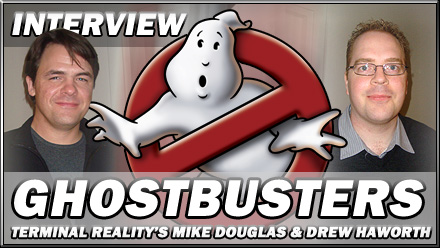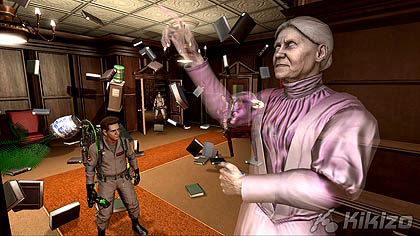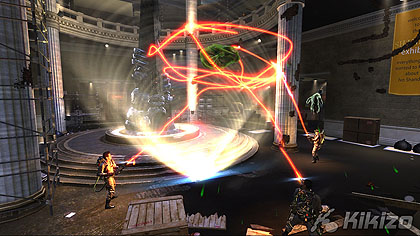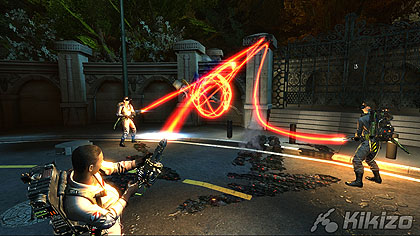Ghostbusters: Terminal Reality Interview
Plenty of new detail revealed in this interview with Ghostbusters: The Video Game developers, Terminal Reality's Mike Douglas and Drew Haworth.

Who you gonna call? Atari, actually. The increasingly headline-friendly publisher swept in like the hand of God to rescue Vivendi's Ghostbusters project when parent company Activision Blizzard wiped it from the books in July.
We're pretty sure the game was worth saving, too, if the recent demonstration we've been shown is anything to go by. As in the 1984 film, the Ghostbusters are a bunch of wise-cracking ex- scientists armed with the latest in anti-paranormal tech. Stepping into the shoes of either Ray Stantz, Winston Zeddemore, Egon Spengler or Peter Venkman, you take a third-person trip through the haunted streets, hotels and libraries of early nineties' New York, snaring the spectral ones with proton energy and trapping them for storage back at your firehouse HQ.
All four of the original 'busters - Dan Ackroyd, Ernie Hudson (see our exclusive interview with him, here), Harold Ramis and Bill Murray - have lent their voices to the experience, and you can expect such classic villains as Gozer, Slimer and the Stay Puft Marshmallow Man to come screeching out of the woodwork.
The game's down for release on every major platform except the PSP: Zen Studios is handling the DS port, Red Fly Studio is tackling Wii and PS2, and Terminal Reality is at work on the Xbox 360, PlayStation 3 and PC versions. As our adrenaline yield is directly proportional to the number of pixels on show, we're most interested in the latter three. Having burbled joyfully at the sight of Ghostbusters: The Videogame in motion, Kikizo caught up with Terminal Reality's Mike Douglas, Producer, and Drew Haworth, Creative Director, for a chat at Atari's epic London event last week. Read on for the story behind the publisher transition, multiplayer modes and how best to piss off Walter Peck.
Kikizo: The game was down for release under Vivendi during Halloween, now it's going to be out in time for the film's twenty-fifth anniversary. For most developers that's a great blessing, being able to spend a few months just polishing off the product. Is that what you're currently doing, or are there other things you're building in?
Haworth: We're no exception - we're very happy with the interval. Some of the cinematics need work, and we're adding a more fluid animation system for the NPCs, working on the sound levelling, and for the most part just improving the experiential aspect of the game. Pacing can be changed, stuff like that, but we haven't added any new features, just improved on features.
Douglas: We're not going crazy with it. At the time the transition actually happened, we were actually pretty close to being near final, so what we're doing is we're making a pass through all the levels, taking a good hard look at every single one, to make sure they all have the same attention to detail, the variety of gameplay... not just fighting ghost after ghost after ghost but there will be environmental interactions, puzzles and other interesting things to do that are within the remit of what Ghostbusters are expected to do... We're just pushing that through all the levels, really taking the time to do it right.
Kikizo: What were your feelings on the game going to Atari? Were you ever worried about ending up in limbo post-Vivendi?
Haworth: I would say we were very confident - or rather cautiously optimistic! - that the game would end up going somewhere we would be happy with it going. We've received a lot of positive feelings about it - people want to love Ghostbusters...
Douglas: We got a lot of insight into the process, too, as it was going along. So within weeks of knowing that the merger was happening, we [could begin moving] the game to another publisher. We had warning well before it was made public. One of the interesting stories we like to tell is that our executive producer for the project - when it was actually made public that Vivendi was not going to publish the game, that date he got twenty to thirty calls while he was in L.A. from publishers just asking "How can we get in on this -"
Kikizo: Was there a bidding war?
Douglas: I don't know the specifics, but my understanding is yeah, there was some competition for it.
Kikizo: There's a story going round that Activision didn't pick it up because they couldn't make a sequel...
Douglas: Yeah, even [Activision boss] Bobby Kotick came out with that... They can't really serialise and annualise a game like this where there's not a movie released every year, and we kind of understand their position on that. We used to have a good relationship with those guys. It's unfortunate, and we were still shocked that they weren't going to carry on with Ghostbusters - it seemed like such a no-brainer to us - but we understand the position, that's just their business problem.
Kikizo: It's not based on a particular film though, so potentially you could do a new game every year, right?
Douglas: Right... There's a lot of people who need to get involved to make this happen, and their input, like from the talent - Dan Ackroyd, Harold Ramis and Ivan Reitman - all of them being involved makes this far more detailed, more time-consuming... that being said, we're really happy to have the extra time because it allows us to pour that much more detail into the levels.
Kikizo: I read at one point that Harold and Dan Ackroyd original wanted to call this Ghostbusters 3 to emphasise that it's not just a knock-off of a film IP, but the definitive follow-up. Has the announcement of an actual Ghostbusters 3 script affected you at all?
Douglas: Once that actually occurred we did have to differentiate it from the movie series, but yes, we had every intention - and so did they, I believe - of making sure that this was representative of the third chapter in the story of the Ghostbusters.
Haworth: This takes place two years after the end of the second movie, so it's in 1991.








 Satoru Iwata Video Interview - the late Nintendo president spoke with Kikizo in 2004 as 'Nintendo Revolution' loomed.
Satoru Iwata Video Interview - the late Nintendo president spoke with Kikizo in 2004 as 'Nintendo Revolution' loomed. Kaz Hirai Video Interview - the first of Kikizo's interviews with the man who went on to become global head of Sony.
Kaz Hirai Video Interview - the first of Kikizo's interviews with the man who went on to become global head of Sony. Ed Fries Video Interview - one of Xbox's founders discusses an epic journey from Excel to Xbox.
Ed Fries Video Interview - one of Xbox's founders discusses an epic journey from Excel to Xbox. Yu Suzuki, the Kikizo Interview - we spend time with one of gaming's most revered creators.
Yu Suzuki, the Kikizo Interview - we spend time with one of gaming's most revered creators. Tetris - The Making of an Icon: Alexey Pajitnov and Henk Rogers reveal the fascinating story behind Tetris
Tetris - The Making of an Icon: Alexey Pajitnov and Henk Rogers reveal the fascinating story behind Tetris Rare founders, Chris and Tim Stamper - their only interview? Genuinely 'rare' sit down with founders of the legendary studio.
Rare founders, Chris and Tim Stamper - their only interview? Genuinely 'rare' sit down with founders of the legendary studio. The History of First-Person Shooters - a retrospective, from Maze War to Modern Warfare
The History of First-Person Shooters - a retrospective, from Maze War to Modern Warfare